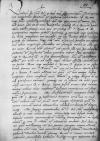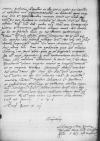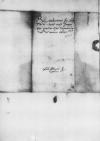List #2787
Marco de la TORRE do Ioannes DANTISCUSCracow (Kraków), 1545-01-26
Regest polski:
Marco de la Torre usprawiedliwia się, że stan zdrowia nie pozwala mu obszerniej odpowiedzieć na otrzymany list i w pełni wyrazić swoje myśli. Najchętniej uczyniłby to w bezpośredniej rozmowie. Przed trzema dniami gwałtowny atak kataru omal nie pozbawił go życia, które nadal pozostaje zagrożone.
Uprzednio przesłane Dantyszkowi proszki były jedynie skromnym wyrazem wdzięczności za doznane dobrodziejstwa; Marco de la Torre ma nadzieję przesłać wkrótce świeższe i lepszej jakości.
Jeszcze raz dziękuje za muszkat - tym bardziej, że spożywa obecnie więcej lekarstw, niż zwykłych potraw.
Przed dwoma dniami rozmawiał w swojej komnacie z królową [Boną] o bezbożnych nowinkarzach oraz o napływie godnych potępienia ksiąg na Litwę. Królowa była oburzona. Co gorsza, herezjarcha i jego poplecznicy podobno zdobyli poparcie niektórych książąt dla swojej działalności kaznodziejskiej w Wilnie. Nie ma tam niestety nikogo, kto potrafiłby stawić czoła ich pokrętnym sofistycznym wywodom. Marco de la Torre wezwał listownie [młodego] króla [Zygmunta II Augusta], aby trwał przy religii ojca i matki i wygnał odszczepieńców ze swego księstwa [Wielkiego Księstwa Litewskiego].
Pozostawia innym korespondentom Dantyszka zawiadomienie go o wydarzeniach w Krakowie. Informuje tylko o pogłoskach, jakoby cesarzowi brakowało pieniędzy na działania wojenne, więc w najbliższym roku nie będzie ich prowadził, co na tyle wzmocni wroga Chrześcijan [Turcję], że zajmie Węgry i Wiedeń i bezpośrednio zagrozi Niemcom. Marco de la Torre obawia się, że może to być zaplanowana kara boża za bezczeszczenie relikwii, plądrowanie świątyń i inne świętokradztwa.
| odebrano Heilsberg (Lidzbark), 1545-02-16 Rękopiśmienne podstawy źródłowe:
Pomocnicze podstawy źródłowe:
| ||||||||||
Tekst + aparat krytyczny + komentarz Zwykły tekst Tekst + komentarz Tekst + aparat krytyczny
 AAWO, AB, D.6, f. [1v] missed in numbering after f. 67
AAWO, AB, D.6, f. [1v] missed in numbering after f. 67
Reverendissimo in Christo Patri, Domino, domino
Reverendissime in Christo Pater et Domine, domine observandissime.
Post animi mei singularem devotionem et perpetuam felicitatem etc.
Quia longe plura intellectus intelligit, quam vox exprimere et manus scribere possit, ideo, ut de meis conceptibus facilius Paternitatem Vestram Reverendissimam participem reddere possem, viva voce et oretenus cum Vestra Reverendissima Paternitate de emergentibus conferre optarem, praesertim quod aegritudo mea catharralis ita impetuose me invasit, ut vix naturae debitum nudius quartus non solverim. Neque etiam nunc a periculo prorsus me reperio, sed adhuc cf. Verg. A. 7.200 qualia multa mari nautae patiuntur in alto ⌊impetuosis fluctibus et furiosis ventis in alto agitor maricf. Verg. A. 7.200 qualia multa mari nautae patiuntur in alto ⌋. Quid autem futurum sit, novit cf. Thomas Super Sent. lib. 1d. 37 q. 1a. 2 Utrum Deus sit in omnibus per potentiam, praesentiam et essentiam; Thomas Super Sent. lib. 1d. 37 q. 1a. 1 arg. 2 videtur quod multo fortius Deus in absentia sui possit effectum producere; et ita non oportet quod sit in rebus quas condidit ⌊ille, qui per absentiam, potentiam et praesentiam rebus omnibus adestcf. Thomas Super Sent. lib. 1d. 37 q. 1a. 2 Utrum Deus sit in omnibus per potentiam, praesentiam et essentiam; Thomas Super Sent. lib. 1d. 37 q. 1a. 1 arg. 2 videtur quod multo fortius Deus in absentia sui possit effectum producere; et ita non oportet quod sit in rebus quas condidit ⌋.
Non mirabitur ergo Vestra Reverendissima Paternitas, si suis humanissimis cf.
Primum enim, quo ad pulveres: tantum abest, quod Vestra Reverendissima Paternitas mihi actura sit gratias, cum loco magni beneficii acceperim hanc occasionem mihi oblatam, quod utique aliqua in re eidem gratificari valuissem, quamquam res se offerat ita vilis, quae neque memoria Paternitatis Vestrae Reverendissimae digna possit censeri. Est tamen animus adhuc alios mittendi pulveres recentiores et forte melius praeparatos.
De muschato autem magnas habeo gratias Paternitati Vestrae Reverendissimae, quod instituerit tempore veris me eo consolatum reddere, nam ad praesens certe magis apotheca orig. apotecha⌈apothecaapotheca orig. apotecha⌉ quam coquina vivo, cum meus stomachus admodum sit deiectus et disgratiatus orig. disgrasiatus⌈disgratiatusdisgratiatus orig. disgrasiatus⌉.
De impiis novatoribus cum serenissima  AAWO, AB, D.6, f. 67vcrimini, praesertim cum nullus in illa patria exstet, qui cavillis et sophisticis eorum argumentationibus ac distortis sacrae scripturae locis et expositionibus occurrere possit aut valeat. Ego tamen, pro mea devotione in catholicam et sanctam fidem, ad serenissimum
AAWO, AB, D.6, f. 67vcrimini, praesertim cum nullus in illa patria exstet, qui cavillis et sophisticis eorum argumentationibus ac distortis sacrae scripturae locis et expositionibus occurrere possit aut valeat. Ego tamen, pro mea devotione in catholicam et sanctam fidem, ad serenissimum
De iis autem, quae hic aguntur, aliis scribendi relinquo locum. De rebus vero bellicis aiunt
Quam cupio valere ex mentis sententia diutissime.
Eiusdem Reverendissimae Paternitatis Vestrae obsequentissimus frater


